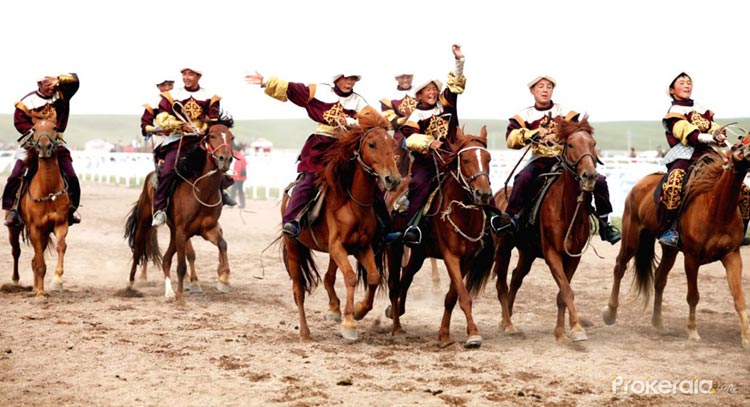Written by: Jia Chunxia
Posted on: March 20, 2018 |  | 中文
| 中文
An equestrian stages a horse show in Zhaosu County of Ili (Source: ProKerala)
Traditionally, Xinjiang is an important region for horse breeding in China, with a long history of horse-raising and therefore a rich horse culture. In recent years, with the sustained and rapid economic and social development, the horse industry in Xinjiang has been driven into new arenas, from traditional horse-breeding and horse-riding to horse culture tourism, horse-racing and other related fields.
In 2013, an international standardized horse racing court, featuring grassland ecology and boasting as the best one in Xinjiang, was set up and put to use in Zhaosu County. Here, more than 80 top horse-racing events in China were held, such as Chinese Endurance Race, Speed Horse Racing Tour of China and Xinjiang “Horse Breeder Cup” Horse-Race. These top horse races not only greatly popularized the Yili horses in Xinjiang, but also drew more and more tourists to Zhaosu County.
“Yili Heavenly Horse Species,” a new breed of horse in Yili, Xinjiang, has become well-known in the country, as well as abroad. The development of “Yili Heavenly Horse” in Zhaosu County is a microcosm of the rapid development of tourism industry of horse culture in Xinjiang. In Xinjiang, horses have always been a natural friend of the people of all ethnic groups. Horse breeding is a folk custom with strong local characteristics while equestrian performances and horse racing are all important activities performed on the traditional festivals of local minorities. People get to know horses very well in their long-term coexistence with them.
In recent years, Xinjiang has promoted the horse industry based on its unique resources of horse breeding, vast natural pastures, and opening-up policy. Currently, there are 894,000 horses in 6 breeding farms in Xinjiang, which occupies one eighth and ranks first in the number of horses in China. The horse resources in Xinjiang, not only in terms of its quantity and varieties, both also in terms of its historical cultural heritage, are irreplaceable.
In late 2015, concerned departments of Chinese government and local government of Xinjiang issued instructions on speeding up the development of modern horse industry. They ordered that a modern system of horse industry should be established. Horse culture tourism is taken as one of the key points, with horse racing as the important driving factor, together with the development of horse breeding, taming, training and trading.
Zhaosu County in Yili has a long history of horse breeding, a rich horse culture and solid horse breeding facilities. Yili in Xinjiang is known as the “Hometown of Heavenly Horse.” And Zhaosu County now has nearly 100,000 horses.

There has been a visible increase in the income of those herders who raise horses by breeding high-quality horses. Lan Ming, a professional horse farm owner, who has lived in Zhaosu County for many years, has brought in high-quality studhorses, and bred a batch of excellent racing horses as a result. With the development of tourism industry in Zhaosu County, Lan Ming's annual income has increased up to 600,000 yuan. “In the past, a pony was worth five thousand yuan, but now through improved breeding and training, a pony can be sold for at least 30,000 yuan, even 100,000 yuan if it’s a good one.”
81 years old Han Tiao, and his wife from Beijing, came to Xinjiang Ancient Ecological Garden for a visit, when they were told that Ferghana Horses were raised in the Base there. Accompanied by friends, regardless of their old age, they paid the horses a visit. With excitement and joy Han Tiao said, “I have known something about the Ferghana Horse only through TV or books, but now I can finally see them. I find that they are robust and gallant, with beautiful and powerful physiques. Their performance is amazing, and the Base is really worth a visit.”
In recent years, Xinjiang has set up more standardized horse racing courses, where traditional racing events are frequently held. With the fast development of equestrian clubs, horse riding for leisure has become a fashion and a healthy way of life. When people breed, ride and race horses, it turns into a culture which integrates with local natural resources and folk customs. In order to boost the development of modern horse industry and to speed up horse culture tourism in Xinjiang, it’s pointed out in a Proposal of Developing Modern Horse Industry through Tourism, issued by Xinjiang Tourism Department, that a group of horse culture tourism resorts equipped with better conditions and infrastructures should be established. In the near future, horse culture tourism in Xinjiang will develop into a new form of tourism industry.
Translated by Tian Guiling
You may also like: